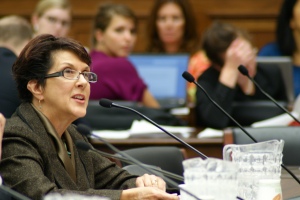After all the hype over Craigslist and the new lawsuit brought against Backpage.com for knowingly promoting the sale of a minor for sex, more Americans are beginning to open their eyes to human trafficking of young girls happening in their neighborhoods and communities. With this new-found awareness comes a new responsibility on the part of all individuals—especially law enforcement personnel. There is a strong need for law enforcement to adapt their responses, pursue deterrence options, and utilize proactive policing techniques to address the crime of human trafficking as it continues to evolve. With the rise of domestic minor sex trafficking, law enforcement seem to struggle to find the appropriate resources needed to deter minors from being prostituted while also charging traffickers and buyers with current laws on the books.
Vednita Carter, founder of Breaking Free, an anti-human trafficking organization in Minnesota geared toward education, rescue, and services for trafficked girls, believes that law enforcement need to stop focusing so much on the pimps and instead target the “johns” or buyers of domestic minor sex. While it may seem easy enough to turn law enforcement’s focus toward johns, the process of implementing this change is not a simple task. More commonly girls, boys, and women are arrested for their “prostituting actions” and put into jail, while buyers go free or experience minimal penalties, usually at most a fine. Ironically, Kristy Childs, founder of Veronica’s Voice a recovery program in Missouri for victims of commercial sexual exploitation, said that this jail time becomes a desired vacation for the victims as they finally receive a break from their work of being forced to have sex with a quota of men per day.
However, arresting victims, booking them, placing them in jail, and consequently giving them a police record is not and cannot be the only available solution; yet this is what we are encountering time after time. For example, a Washington, DC law enforcement officer, whom I spoke to regarding this issue, stated multiple reasons for the lack of proper response to victims. One of the main problems facing law enforcement is the general lack of awareness. He admitted that he only received training after voluntary choosing to attend a supplemental training program outside of his professional requirements. He also stated that lack of resources greatly contributes to the choices law enforcement make in arresting minor victims and putting them in jail instead of finding shelters or alternative options for them. In some cases, education, language, and cultural barriers of the victims present a huge issue for inexperienced law enforcement in identifying these individuals as victims of trafficking or providing accurate and understandable options for victims.
This officer also mentioned two interesting aspects related to domestic minor sex trafficking victims. The first surrounds the harsh reality of the situation at hand and shows that even when victims are placed into a halfway house or shelter, if that agency is not specifically trained and geared toward victims of trafficking the victims will often run away and return to the streets, therefore putting them at risk to be trafficked once again. This happens when the alternative housing facilities do not adequately supply the needs of the victims that their traffickers fulfill, such as love/attention, food, clothes, shelter, etc. The second viewpoint asks individuals to determine whether law enforcement or judges should be making the determinations to place victims in alternative housing and shelter programs. The officer posed a scenario in which the police choose to place the victim in a house only to result in her escaping because she decides she does want to be there. The issue becomes further complicated if a reporter runs a story placing blame on law enforcement for not charging the individual and instead letting her go to become a public nuisance.
These are just some of the problems that law enforcement face on a daily basis when encountering victims of domestic minor sex trafficking. However, some counties have seen improvement through their policing efforts by offering training to officers, providing shelters and choosing not to arrest the victims. These efforts are a work-in-progress that must continue to adapt to the dynamic needs of our nation’s youngest and most vulnerable victim groups.
It is worth noting the necessity of shelters and alternative options for victims. Shelters will allow law enforcement to cease placing victims into detention homes and will undoubtedly provide appropriate rehabilitation and services victims so badly need. One such development moving in this direction is the imminent need to pass legislation that will enable both law enforcement training and the building of domestic minor sex trafficking-specific shelters. Currently H.R. 5575, the Domestic Minor Sex Trafficking Deterrence and Victims Support Act of 2010 is attempting to get block grants that will provide for increased training, resources and money that will go toward law enforcement and shelters working directly to impact victims and offer them improved services. America is finally beginning to notice these hidden victims and taking action to help them. Bills such as this one take another step in moving toward better solutions for victims of domestic minor sex trafficking.
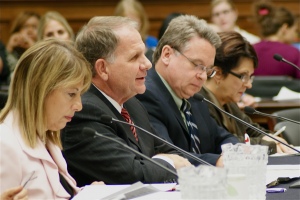 Sub-Committee on Crime and chaired by Representative Bobby Scott ( D-VA ), was to get input on The Domestic Minor Sex Trafficking Deterrence and Victims support Act of 2010 (H.R. 5575). The house legislation is a companion bill to Senate bill (S.R. 2925) introduced by Senators Ron Wyden (D-OR) and John Cornyn (R-TX).
Sub-Committee on Crime and chaired by Representative Bobby Scott ( D-VA ), was to get input on The Domestic Minor Sex Trafficking Deterrence and Victims support Act of 2010 (H.R. 5575). The house legislation is a companion bill to Senate bill (S.R. 2925) introduced by Senators Ron Wyden (D-OR) and John Cornyn (R-TX).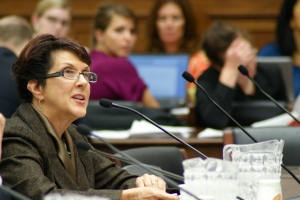 Linda Smith, founder of Shared Hope International and former Congresswoman, shared the story of a victim she had recently helped. Smith also addressed the demand side of the business – calling for tougher prosecution of the men who buy sex to deter demand for sex services from children.
Linda Smith, founder of Shared Hope International and former Congresswoman, shared the story of a victim she had recently helped. Smith also addressed the demand side of the business – calling for tougher prosecution of the men who buy sex to deter demand for sex services from children.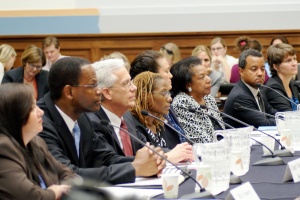 Service and Law Enforcement Relations, testified along with Craigslist counsel Elizabeth McDougall. Craigslist representatives said the closing of the adult section could be viewed as a step backward, since Craigslist collaborated with law enforcement and aided in capturing traffickers via that section of the Web site. They pointed out that venues like Backpage.com may not collaborate as efficiently with law enforcement to help build cases against traffickers selling minors for sex online.
Service and Law Enforcement Relations, testified along with Craigslist counsel Elizabeth McDougall. Craigslist representatives said the closing of the adult section could be viewed as a step backward, since Craigslist collaborated with law enforcement and aided in capturing traffickers via that section of the Web site. They pointed out that venues like Backpage.com may not collaborate as efficiently with law enforcement to help build cases against traffickers selling minors for sex online.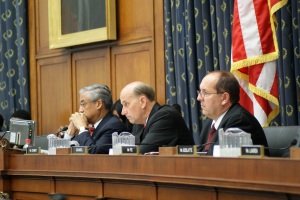 “Subcommittee will now come to order, and I am pleased to welcome you [to]…today’s hearing before the Subcommittee on Crime, Terrorism, and Homeland Security. The committee is hearing Domestic Minor Sex Trafficking and specifically,
“Subcommittee will now come to order, and I am pleased to welcome you [to]…today’s hearing before the Subcommittee on Crime, Terrorism, and Homeland Security. The committee is hearing Domestic Minor Sex Trafficking and specifically, 